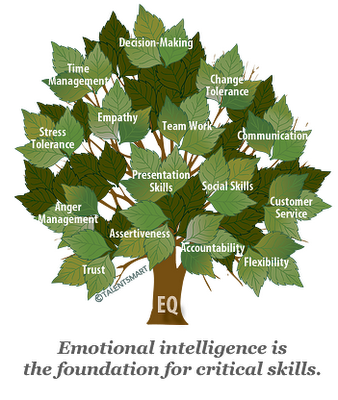- Becoming aware of your emotions.
- Self-regulating your emotions.
- Recognize and empathize with the emotions of others.
Emotional Intelligence is learning how to “read” and understand emotions that are being communicated or passed along. The ability to read body language, facial expressions, tone of voice, but especially the underlying emotions of any communication stand as the most prominent components. Most people are able to tell you what they think of something readily, but not paying attention to the emotion behind the content. Teaching yourself to recognize emotions, then reflect them empathetically is a great place to start with your spouse, partner, children or colleagues.
- Self-Awareness
- Self-Management
- Social Awareness,
- Relationship Management.
In a new book, Emotional Intelligence 2.0 Bradberry and Greaves give you a model for enhancing your EQ. The tree graphic illustrated many of the unique aspects or components of EQ. With practice you can develop the fundamentals of EQ, increase interpersonal flexibility and connection. Coaching can help you tune in, control and empathize with others. This will build relationships and your career.





